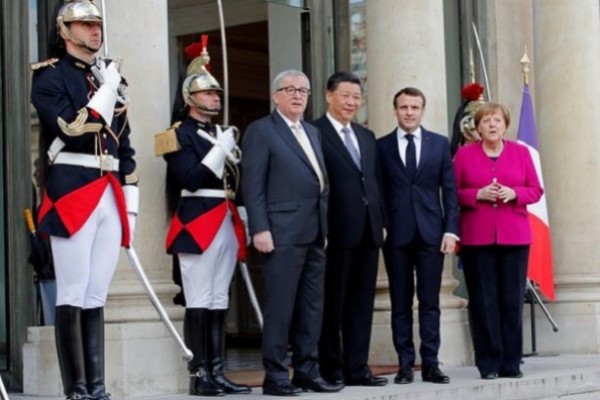| Mini-summit in Paris is a snub to Donald Trump trade policy | |

| Author: CSEBA / The Guardian |
| 27th March 2019 |
| PARIS - Donald Trump was not on the guest list for Emmanuel Macron’s mini-summit in Paris, but the presence of the US president was still very much felt as Europe’s leaders sat down to talk trade, business deals and geopolitics with China’s Xi Jinping. |
|
At one level, the message from the meeting of China’s leader with Macron, the German chancellor Angela Merkel and the European commission president Jean-Claude Juncker was obvious: this was a show of unity in the face of Trump’s tariffs aimed across both the Atlantic and the Pacific. The substance of the summit, though, was more complex than that and each of the participants had something they wanted out of it. Germany’s export-driven economic model has been stuttering, with Europe’s biggest economy only just avoiding a technical recession in the second half of 2018. Merkel wanted a commitment from Xi of speedier trade liberalisation. For Macron, the summit was a chance not just to play the world statesman at a time of domestic unrest but also to push his vision of how Europe in general and France in particular can champion a global economy underpinned by liberalised markets and a respect for human rights. Juncker was keen to show that, for all its problems, Europe still has a place at the global top table alongside the US and China. Collectively, Europe’s leaders are as nettled by the difficulty in accessing China’s huge and growing market as is Trump. They want to stop China dumping its excess produce in western markets and have, to an extent, been hiding behind the US president as he has accused Beijing of unfair trading practices including the theft of western intellectual property. Xi is aware that the Europeans are rapidly approaching the point where they will be prepared to retaliate – hence his charm offensive this week. In a sign that it too knows a thing or two about protectionism, the EU is about to introduce a system that will screen China’s inward investment, especially in the field of strategic infrastructure. This would be a problem for Xi for two reasons. Firstly, China can ill afford any hindrance to its trade with Europe at a time when its exports are already being affected by a slowdown in global trade. Secondly, the Chinese leader wants his Belt and Road initiative – the reconstruction through a network of infrastructure projects of the old Silk Road – to stretch from east Asia to the heart of Europe. For Xi it was both a diplomatic and commercial coup to persuade Italy last week to become the first EU country to join the Belt and Road initiative. Relations between Rome and Paris have already been strained by the support given by Italy’s deputy prime minister Luigi Di Maio to the yellow vest protests that have disrupted parts of France in recent months, and the prospect of China buying up key pieces of Italian infrastructure has ratcheted up the tension. Significantly, there was no place for Italy’s prime minister, Giuseppe Conte, at the Paris pow-wow. |
 |
|
| 23rd November 2024 | |
| China has good news for Croatian citizens | |
 |
|
| 7th November 2024 | |
| Pelagos net farm products presented at the Shanghai fai | |